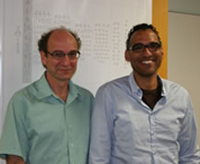
The comments and questions have been floating about for years:
“Kids these days don’t talk anymore. They only text.”
“Don’t college kids have any shame? They spill their guts on Facebook before talking to a real-live person.”
Are these claims true? Or does mobile technology actually help students to learn to better express themselves and ultimately enhance their face-to-face interactions?
These are the types of questions that will studied and answered during a pioneering three-year study by the University of Notre Dame’s Wireless Institute, a research center aimed at developing innovations and educating students in wireless technology, economics, and regulatory policy. Sprint will help the Wireless Institute by providing 200 devices and two years of service for the students who volunteer for the study, funded by a grant from the National Science Foundation.
“Mobile technology is central to the lives of American youth,” said Dan Hesse, Sprint CEO. “They’re masters at social networking, gaming, and multitasking. There’s an interest in learning if this technology has changed their face-to-face behavior. We are honored to partner with such a highly respected university on this landmark study.”
Hesse is an alumnus of Notre Dame and the College of Arts and Letters.
More than 98 percent of college students own a cell phone, according to a 2010 study from Ball State University. The study also found that 97 percent of students use text messaging as their main form of communication. The Wireless Institute study will delve deeper into students’ usage habits and also track how that usage affects their face-to-face communication. The study’s findings will provide a broader understanding of how technology is embedded in students’ lives as they transition from teenagers to young adults.

Four Notre Dame professors—David Hachen and Omar Lizardo from the Department of Sociology and Aaron Striegel and Christian Poellabauer from the Department of Computer Science and Engineering—will lead the study, which will monitor 200 students with specially outfitted smartphones from Sprint. The devices will have a lightweight agent that tracks how students use the phones and how they interact digitally with fellow students.
The monitoring will include: location data, such as proximity to other participants; digital communications, such as social networking, email or texting; and digital marketplace, such as app purchases, usage, and music.
Starting this fall, 200 incoming Notre Dame freshmen will volunteer for the study, review and sign consent and waiver forms, and be tracked for two years. The third and final year of the study will be spent analyzing and releasing the comprehensive data on students’ usage and behavior.
“The study will offer an unprecedented look into how students use mobile devices,” Striegel says. “The data gathered from the study will offer profound insights about the social impact of always-on network access as well as improve how we design and manage future wireless networks. The relationship with Sprint allows us to offer a cutting-edge smartphone united with unlimited text and data services to a sizeable portion of the incoming freshman class.”
In addition to the NSF study, Sprint and the Wireless Institute begin a six-month joint research project this month to study consumer behavior on the Sprint 3G network. During this study, researchers will visualize traffic patterns on the network to study customer segmentation and busy hours at a cell site level. Among other things, they also will explore which handsets dominate the traffic of particular towers. The data from this large-scale visualization will then be analyzed for meaningful trends that can, in turn, be used to support the customers on Sprint’s network.
“Delving deeper into the inner workings of network behavior will enable us to further predict usage trends,” says Bob Azzi, Sprint senior vice president, network. “With increased data demands driven by advanced devices and applications, it’s vital for us to stay on top of our continual efforts to improve our customer experience.”
The Wireless Institute builds upon longstanding strengths in basic research in communication technologies which began on the Notre Dame campus in 1899 with one of the first long-distance wireless transmissions in North America. The Wireless Institute consists of an interdisciplinary team of faculty, students and staff from the Colleges of engineering, business, and arts and letters that is actively developing strategic partnerships within key segments of the wireless industry and with relevant government agencies.
Learn More >
- Wireless Institute
- Department of Sociology
- David Hachen faculty page
- Omar Lizardo faculty page
- Related story: Study Links Cell Phone Usage and Relationship Strength
- Sprint official press release
Originally published at newsinfo.nd.edu.


